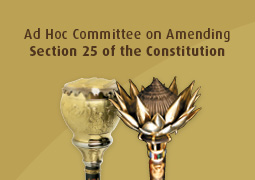
Insession writer Mava Lukani spoke to a number of people who attended the Ad Hoc Committee on Section 25 of the Constitution’s public hearings in Tsolo yesterday in the Eastern Cape. The people he spoke to included representatives of different political parties, associations and individuals.
The majority of the people he spoke in the venue and outside referred to the failure of the “willing buyer, willing seller” principle, which the first democratic government introduced as a tool to deal with the legacy of the exclusion of the majority of South Africans from land by the systems of colonialism and apartheid.
Some argued that the principle failed because of the unwillingness of those who own the land to share it with the historically disposed and the majority of South Africans. Others argued that the principle failed because of the failure of the government to put strategies in place to effect the principle and the exclusion of God in the efforts of correcting the wrongs of the past.
Mr Xolile Nkomphela of Tsolo’s Ntshiqwa Village, who is the Chairperson of the Ntshiqwa Farmers Association, said the government’s mistake was to assume that the voluntary willing buyer, willing seller principle would work without some force. He said: “Land is the economy and that was why it was taken violently by the settlers when they came in this country. The argument that they would voluntarily give it to us was fallacious and a waste of time. The solution is expropriation of land without compensation.”
Mr Ngawonke Bulala of Mhlontlo Youth Unemployment Forum said they have been appealing to the farmers who own many hectares of land in Maclear and surrounding areas in the Mhlontlo Local Municipality, but without success. “The worrying reality is that the small land that is at our disposal is unproductive, as it is part of the unproductive 13% of land that was given to the black people by the colonial government. Our Maclear brothers and sisters own large hectares of the productive land and their eyes don’t see that we are suffering. Now is the time to expropriate our land without compensation. We have waited for 25 years without a positive response.”
Ms Gladys Mazitshana of the African National Congress (ANC) said the ANC always applies all the strategies of persuasion and avoids the application of force. In its history, it resorted to the use of force when all the other avenues of negotiations have been exhausted and produced no results. “The ANC led government introduced the willing buyer, willing seller principle to ensure peaceful land distribution in South Africa. The ANC has urged the minority that owns the 87% of the productive land to share it with the historically marginalised South Africans, especially those who show willingness to work the land. We have reached a point where other means should be applied to ensure that land is distributed equally among South Africans.”
Mr Thamsanqa Futwa of the Economic Freedom Fighters (EFF) said that the party demands that the land that was taken violently from its rightful owners through the notorious and vicious laws, such as the Native Land Act, must be expropriated without compensation. He said the black people were left with nothing by the colonial government, which was heartless. “They cleared our forebears. They took land and gave them little and unproductive land. The took livestock from our forebears and stipulated the number our of livestock our forebears could own. They killed the natural mind of confidence in our forebears and replaced it with the mind of trusting on the white people for survival and foreign investors. Hence this irritating warning about avoiding chasing foreign investors, when we are sorting our land issues.”
Ms Lindiwe Liwani of the Democratic Alliance (DA) said the DA is opposed to land expropriation, as the Constitution spells out how land distribution should be done. “When you read the Constitution, you note that its drafters understood what they did and did it wisely and perfectly. In its current form, the Constitution indicates how land distribution should take place and there is absolutely no need to amend the Constitution. The government must just ensure that the people have title deeds and stop the chiefs in the rural areas from selling land to the people.”
Ms Noxolo Xesibe, of Nyandeni Forum of Churches, said the willing buyer, willing seller principle failed because of the rejection of God by the government and the people. “As the forum, we urge the people to put God at the centre of their attempts to fix the legacy of colonialism. If God is not at the centre, even the expropriation of land with or without compensation is also going to fail. Indeed, as the forum we are saying something must be done to correct the wrongs of the past. But it must be correction not the creation of the new wrongs. There is a major element of corruption, which is also exposed by the Zondo Commission, which affects everything the government does. There is a great likelihood that this land expropriation process is also going to be affected by corruption. Hence we call for the involvement of God in this.”

